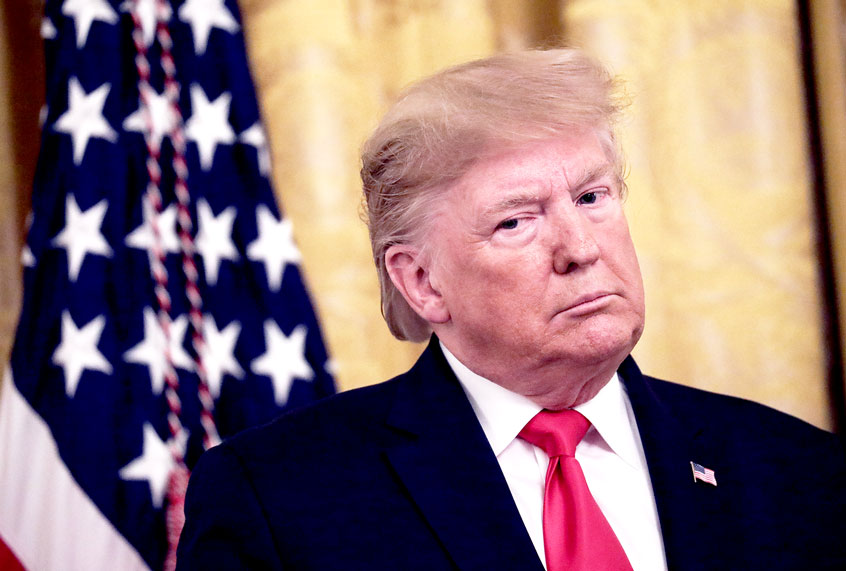The Justice Department’s inspector general concluded that there was no evidence that the Federal Bureau of Investigation (FBI) spied on President Donald Trump’s campaign as he has repeatedly claimed, The New York Times reports.
Trump declared last week on “Fox & Friends” that the inspector general’s report would be “historic” and show “perhaps the biggest scandal in the history of our country.” But Inspector General Michael Horowitz’s report, expected to be released on Dec. 9, undercuts much of the president’s claims during the Russia investigation that the FBI was politically motivated and spied on his campaign.
The investigation found no evidence that the FBI attempted to place undercover agents or informants into his campaign, according to The Times.
Trump previously claimed, without evidence, that the FBI had sent a spy to infiltrate his 2016 campaign for “political purposes.” He also baselessly accused former President Barack Obama of wiretapping him during the campaign. Attorney General Bill Barr also suggested that the FBI had spied on the president’s campaign.
The report also concluded that FBI officials were not politically motivated in their pursuit of a wiretap of former Trump campaign adviser Carter Page after his departure.
Though the report is expected to criticize certain aspects of the FBI’s handling of the Russia investigation, including errors which were discovered in the FBI’s pursuit of a wiretap on Page, the report undercuts much of Trump and the Republican Party’s defense of the president in the Russia scandal, according to The Times.
The report found that the FBI acted properly when it opened the investigation into the Trump campaign’s ties to Russia. The investigation began after former Trump campaign adviser George Papadopoulos bragged to an Australian diplomat that he had been offered damaging information about former Democratic presidential nominee Hillary Clinton.
Trump has also claimed that there was “at least one FBI representative implanted, for political purposes, into my campaign,” which he described as the “all time biggest political scandal.”
Though the FBI did have an undercover agent pose as an assistant to a professor named Stephen Halper for a London meeting with Papadopoulos, Horowitz found no evidence that the professor had attempted to infiltrate the campaign or that the FBI had directed him to do so, according to The Times. The FBI maintains that it never investigated the campaign itself and that Halper only attempted to get information from Papadopoulos and Page on their ties to Russia.
Barr previously suggested that the FBI had other informants on the case, but Horowitz found no evidence that the FBI had deployed others to learn about the advisers’ ties to Russia, according to the Times report, which noted that it was unclear if Horowitz found any unsolicited material from within the Trump campaign itself which was sent to the FBI.
Trump allies have also claimed that another professor, Joseph Mifsud, was also an FBI informant. Mifsud is the Russian intermediary who first told Papadopoulos about the Clinton information. Papadopoulos has also claimed that this was a setup by the FBI after he pleaded guilty to lying to the bureau about his contacts with the professor.
The Horowitz report found that Mifsud was not an FBI informant, and the FBI was not even able to interview him.
The report also debunks the claims of Trump allies that the FBI used the Steele dossier in its investigation, though it did cite the dossier in an application for a wiretap on Page. The report is expected to say that the FBI omitted information in their application about the dossier, and that FBI agents received different information from some of Steele’s sources.
Along with the Page wiretap application, the report is expected to criticize former Justice Department official Bruce Ohr for failing to disclose that he had spoken with Steele multiple times in 2016 to his superiors.
After The Times reported about the contents of the Horowitz report, many observers suggested that he himself would soon be accused of working against Trump, because it failed to corroborate his long-running grievances against the Justice Department.
“Has Horowitz been called an Obama Deep State mole yet?” asked national security attorney Bradley Moss.
Former Obama aides saw the report as vindication after years of false allegations.
“Three years of Fox News segments and Presidential tweets turned out to be complete BS,” wrote former Obama adviser Dan Pfeiffer.
Matthew Miller, a former Justice Department spokesman, expressed hope that Horowitz would not turn his attention to the mounting allegations of wrongdoing by Barr.
“I don’t have so much of a problem with Horowitz investigating some of the allegations surrounding the 2016 election, because that’s his job,” he told NBC News. “But it is striking to me that with all of Barr’s known misconduct, all of the instances of conversations between senior leadership and the White House, there doesn’t seem to have been a single investigation into any that.”

